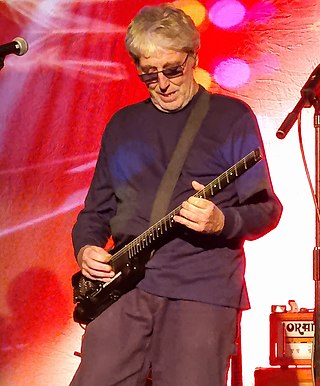
Stephen Simpson Hillage is an English musician, best known as a guitarist. He is associated with the Canterbury scene and has worked in experimental domains since the late 1960s. Besides his solo recordings he has been a member of Khan, Gong and System 7.
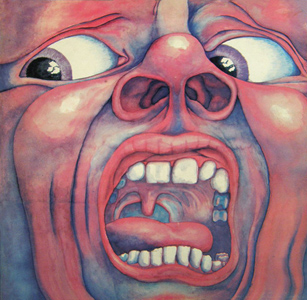
In the Court of the Crimson King is the debut studio album by English progressive rock band King Crimson, released on 10 October 1969, by Island Records. The album is one of the earliest and most influential of the progressive rock genre, with the band combining musical influences that rock music was founded upon with elements of jazz, classical, and symphonic music.

Hot Rats is the second solo album by Frank Zappa, released in October 1969. It was Zappa's first recording project after the dissolution of the original version of the Mothers of Invention. Five of the six songs are instrumental, while "Willie the Pimp" features vocals by Captain Beefheart. In his original sleeve notes, Zappa described the album as "a movie for your ears".

Hergest Ridge is the second studio album by English musician and songwriter Mike Oldfield, released on 30 August 1974 by Virgin Records. The unexpected commercial and critical success of his debut album, Tubular Bells (1973), affected Oldfield, who decided against touring and avoided the press with his newfound fame. Instead, he retreated to Hergest Ridge on the England–Wales border and wrote the follow-up, which he recorded in 1974 at The Manor in Oxfordshire, with Tom Newman returning as co-producer. Similar to Oldfield's first, the album is a single composition split into two parts covering different moods and musical styles.
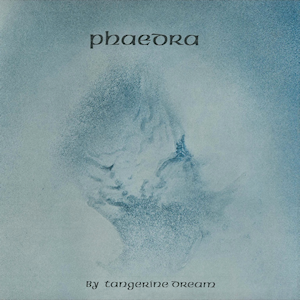
Phaedra is the fifth studio album by German electronic music group Tangerine Dream. It was recorded during November 1973 at The Manor in Shipton-on-Cherwell, England and released on 20 February 1974 through Virgin Records. This is the first Tangerine Dream album to feature their now classic sequencer-driven sound, which is considered to have greatly influenced the Berlin School genre.

The Hurdy Gurdy Man is the sixth studio album by Scottish singer-songwriter Donovan. It was released in North America in October 1968 on Epic Records, but not in the UK due to a continuing contractual dispute that also prevented Sunshine Superman (1966) and Mellow Yellow (1967) from being released there. A songbook of lead sheets to the album was nonetheless issued in both countries. In Canada the album reached No. 19.
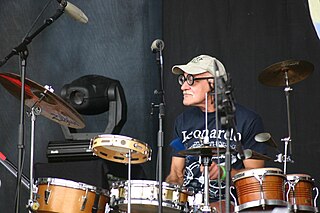
Clive William Bunker is a British drummer. Bunker is best known as the original drummer of the rock band Jethro Tull, playing in the band from 1967 until 1971. Never a self-professed technical drummer, Bunker engaged with the essence of blues and rock and roll, influenced by Ginger Baker and Mitch Mitchell. He was also inspired by Buddy Rich and The Hollies' Bobby Elliott.

The Least We Can Do Is Wave to Each Other is the second album by the British progressive rock band Van der Graaf Generator, released in February 1970 on Charisma Records. It was the group's first album to be released in the UK and the only one to chart in the top 50 in that country.

Moonmadness is the fourth studio album by English progressive rock band Camel. It was released in April 1976 on Decca and Gama Records and is their last album recorded by the group's original line-up of Andrew Latimer, Peter Bardens, Doug Ferguson, and Andy Ward. After reaching success with their previous album, the all-instrumental The Snow Goose, the band started on a follow-up and incorporated vocals and lyrics to the new music. Moonmadness has a loose concept with one track based on the personality of each band member: "Air Born" for Andrew Latimer, "Chord Change" for Peter Bardens, "Another Night" for Doug Ferguson, and "Lunar Sea" for Andy Ward. In 2018, 42 years after its release, Camel performed the album live in its entirety.

Music in a Doll's House is the debut album by English progressive rock group Family, released on 19 July 1968. The album, co-produced by Dave Mason of Traffic, features a number of complex musical arrangements contributing to its ambitious psychedelic sound.

Hatfield and the North is the first album by the English Canterbury scene rock band Hatfield and the North, released in February 1974.

"Hurdy Gurdy Man" is a song by the Scottish singer-songwriter Donovan. It was recorded in April 1968 and released the following month as a single. The song gave its name to the album The Hurdy Gurdy Man, which was released in October of that year in the United States. The single reached number 5 on the Billboard Hot 100 in the U.S. and number 4 on the UK Singles Chart.

Angel's Egg is the fourth studio album by the progressive rock band Gong, released on Virgin Records in December 1973.
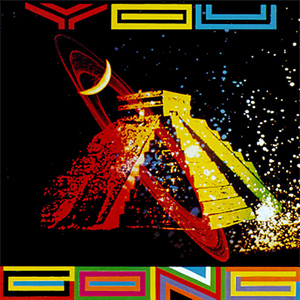
You is the fifth studio album by the progressive rock band Gong, released by Virgin Records in October 1974. It is the last album by Daevid Allen's iteration of the group until 1992's Shapeshifter. Recorded at Virgin's Manor Studios in Oxfordshire, England, side 1 was mixed at Pye Studios, Marble Arch, London, while side 2 was mixed at The Manor. It was produced by Simon Heyworth and Gong "under the universal influence of C.O.I.T., the Compagnie d'Opera Invisible de Thibet", and also engineered by Heyworth.
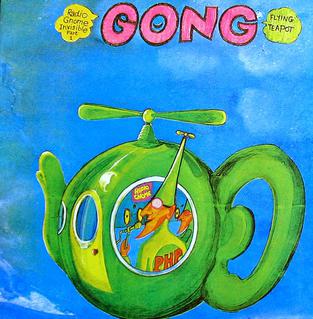
Flying Teapot is the third studio album by the progressive rock band Gong, originally released by Virgin Records in May 1973. It was the second entry in the Virgin catalogue (V2002) and was released on the same day as the first, Mike Oldfield's Tubular Bells (V2001). It was re-issued in 1977, with different cover art, by BYG Actuel in France and Japan. Recorded at Virgin's Manor Studios, in Oxfordshire, England, it was produced by Giorgio Gomelsky and engineered by "Simon Sandwitch 2 aided by Tom Zen".

Shamal is the sixth studio album released under the name Gong and was released by Virgin Records on 13 February 1976 The album, produced by Pink Floyd drummer Nick Mason, was recorded in December 1975 by a unique line-up referred to later as "Shamal-Gong". It is usually regarded as a transitional album between Daevid Allen's incarnation of the band and the Pierre Moerlen-led fusion line-up of the late 1970s.

Motivation Radio is the third studio album by British progressive rock musician Steve Hillage, released by Virgin Records in September 1977.
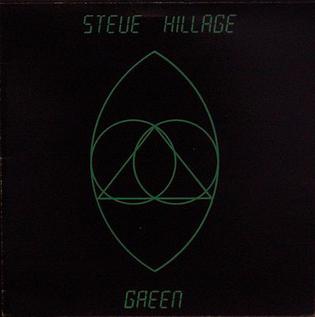
Green is the fourth studio album by British progressive rock musician Steve Hillage, released by Virgin Records in April 1978.

BBC Radio 1 Live : Steve Hillage Live in Concert is a live album by British progressive rock musician Steve Hillage, originally recorded for the BBC at the Paris Theatre, London. Tracks 1 and 6 are from the performance from 4 December 1976 and were produced by Jeff Griffin. The remaining tracks are from 28 April 1979 and were produced by Chris Lycett.

Disco Jets is a tongue in cheek project organized and recorded by Todd Rundgren and Utopia shortly after recording Rundgren's Faithful LP and including most of the musicians from those sessions. It's an instrumental recording humorously parodying 1976's US Bicentennial celebrations, disco music, science fiction films and the CB radio fads. It was released in 2001, 25 years after its recording, as part of the Todd Archive Series Vol. 4 – "Todd Rundgren Demos and Lost Albums" 2-CD set on Rhino Entertainment/Crown Japan. It was reissued in 2012 as a standalone CD import on Esoteric Recordings and in 2015 on Cherry Red. It was also released as a limited edition vinyl that was manufactured exclusively by Cherry Red for Record Store Day, only appearing in record shops from Saturday 16 April.




















